Education
D.C. parents protest Congress’ proposed $1B cut to city’s budget

WASHINGTON — School was out on Thursday, so D.C. parents decided it was time for a field trip to Capitol Hill.
There, they lobbied against Congress’ temporary government funding bill that could slash the city’s budget by more than $1 billion and leave public schools vulnerable to cuts.
Parents mobilized one another to call members of Congress, show up at senators’ offices and lobby Senate staffers who have children in D.C. public schools. They coordinated their actions through PTAs, group chats and email listservs, while also urging family members outside of the district to contact their members of Congress.
Follow live politics coverage here
One text in a group chat of D.C. parents noted that a Senate Republican staffer had children at their school, adding that there was a movement to corner her. Another parent told NBC News that parents have been working to figure out which Capitol Hill staffers with children in public schools could be reached.
Some parents have been leveraging relationships with people who may hold sway on the Hill.
“Parents have described staffers who they are either personal friends with or former colleagues that they have reached out to personally,” Emma Kelly, a D.C. public schools parent, said.
The city’s fiscal year 2025 budget was approved last year, increasing the budget by more than $1 billion. But the funding bill being considered by Congress would force the city to revert back to fiscal 2024 budget levels, reducing the city’s spending by $1.1 billion in six months, D.C. Mayor Muriel Bowser said this week.
Previous temporary government funding bills, known as continuing resolutions, have had provisions allowing D.C. to continue spending funds in line with the city’s current fiscal year budget, rather than the previous one. Such a provision was excluded from this week’s bill.
As parents protested at her colleagues’ offices, Sen. Susan Collins, R-Maine, told reporters that she would speak with Bowser on Thursday.
“I do not support this restriction on the District of Columbia’s ability to use its own funding,” said Collins, who chairs the Senate Appropriations Committee. She added, however, that she still plans to vote for the bill.
Parents have been focusing on outreach to Republicans and moderate Democrats, emphasizing to members of Congress that their staffers are often D.C. residents whose kids may attend the city’s public schools.
Multiple parents told NBC News that their lobbying of other parents took place privately through text messages and interactions in schools and neighborhoods, nervous that their employers would look negatively on activism during a new presidential administration.
One woman who has a child in D.C. public schools told NBC News that she had spoken with Sen. Lisa Murkowski, R-Alaska, on Wednesday about the bill’s impact on D.C.’s budget. Murkowski seemed receptive and said that her staffers remind her frequently that they are all D.C. residents, the woman said.
D.C. does not have voting members of Congress, so parents and children roamed the floors of the Hart Senate office building on Thursday, urging Senate staffers to protect the city’s funding.
“It was important for me to go to Senate Hart, largely because I’ve been watching the educators around me continue to give their all to raising future generations,” said 16-year-old Erica Floyd, who attends a D.C. public high school and visited a Senate office building to try to talk to senators. “Their perseverance, dedication and support for students and their education inspired me to do my part and advocate for my peers’ education and my own.”
Sixth graders Leo Benevelli, Jake Kaplan and Jake Zelin visited Sen. Jon Ossoff’s office with their moms after he said he was assessing the bill. Ossoff, a Democrat from Georgia, is up for re-election in 2026.
“I really don’t think this is what the Founding Fathers of our country would have wanted, and our country is built by teachers and schools,” Benevelli said.
Several of the advocates who visited Capitol Hill on Thursday invoked their upbringing as they brought their cases to Senate staffers.
Douglas McRae was born and raised in Mississippi and now lives in D.C. with his 4-year-old son, Luca, who is in the city’s pre-K program. The two visited Sen. Cindy Hyde-Smith’s office on Thursday with other advocates, urging the staff for the Mississippi Republican to ensure that the city’s budget remained in tact.
McRae has asked his parents and Luca’s aunt and uncles in Mississippi to contact their members of Congress.
“I’ve told them to reach out and call as well to make sure that people in Mississippi are not OK with this,” he said.
It’s a tactic used by other D.C. families, too, who worry that their voices won’t be heard without a voting member of Congress. The city has a delegate and two shadow senators, but they cannot vote on legislation.
“I’ve asked my family and my friends who live in states with voting senators to please advocate on our behalf,” said Caitlin Rogger, whose 8- and 10-year-old children are in D.C. elementary schools. “The Senate can turn this around, but D.C. doesn’t have a senator who can vote, so there’s no one beholden to my neighbors and me for this decision.”
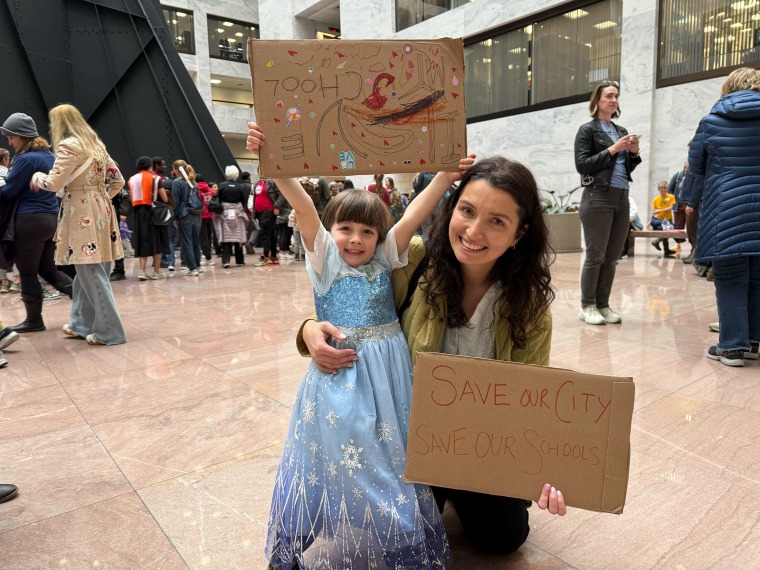
Ashley Smith Thomson visited senators’ offices Thursday, one day after her latest chemotherapy treatment for breast cancer. She is on medical leave, which is putting a strain on her finances and has her worried about what potential spending cuts could mean for child care in D.C.
“If it goes away, I don’t know what I’m going to do with my daughter while I’m recovering from a double mastectomy,” said Smith Thomson, whose child is in first grade.
It’s unclear exactly what programs would face funding cuts if the bill goes through, but the mayor has laid out that some of the top areas that the city spends money on are public education, public safety and Health and Human Services.
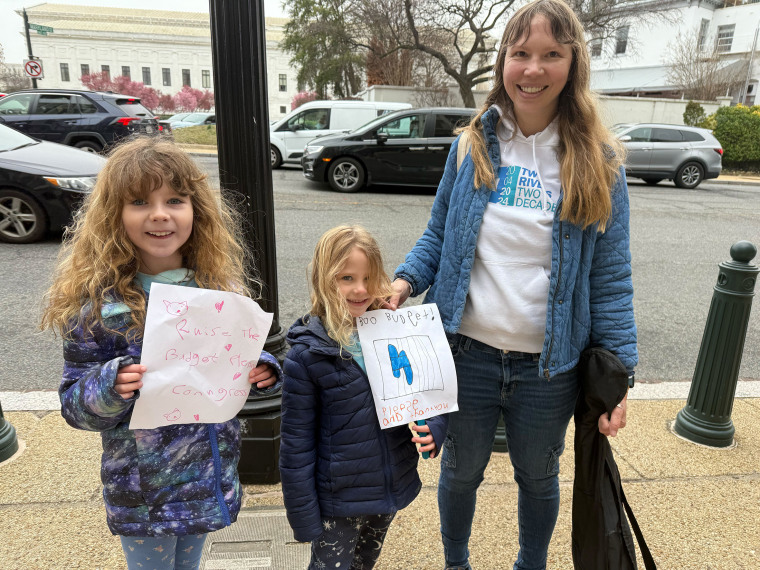
Megan Lebowitz / NBC News
“There’s no way to cut that kind of money in the time that we would have in this fiscal year not to affect police or not to affect teachers and not to affect some of the basic government services that allow us to keep our city clean, safe and beautiful,” Bowser told reporters Monday.
When reached for comment, a spokesperson for the mayor said that her office is “hopeful that our partners in Congress will get it fixed this week.”
A spokesperson for Rep. Tom Cole, R-Okla., who chairs the Appropriations Committee and introduced the bill this month, did not respond to a request for comment about the bill’s impact on D.C.’s funding.
The House voted on Tuesday to pass a six-month funding bill that mostly maintains similar funding levels from 2024. The Senate has not yet voted on the bill, but Democrats have said they will reject it. The government faces a Friday night deadline to avoid a shutdown.
Education
Harvard sues the Trump administration over move to block foreign student enrollment
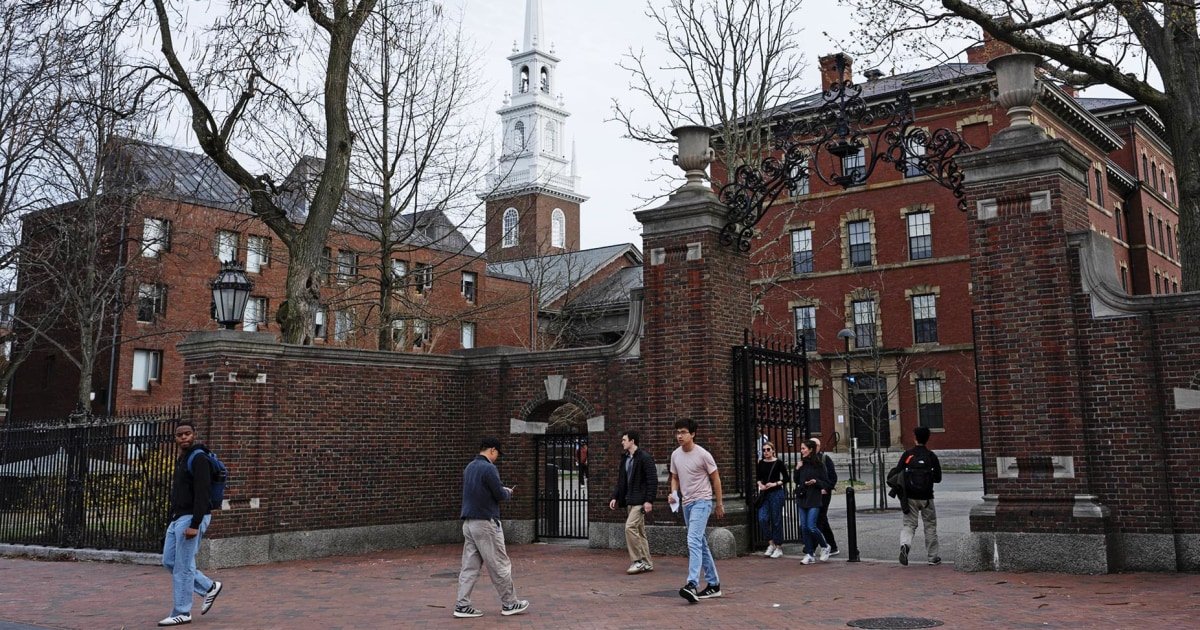
Harvard University sued the Trump administration on Friday, a day after the federal government said it would block the nation’s oldest university’s ability to enroll foreign students.
In a complaint filed in a U.S. District Court in Massachusetts, Harvard argued that the administration’s effort to block foreign students from enrollment violates the university’s First Amendment rights and would dramatically alter its ability to operate.
“With the stroke of a pen, the government has sought to erase a quarter of Harvard’s student body, international students who contribute significantly to the University and its mission,” the complaint states.
On Thursday, the administration terminated Harvard’s Student and Exchange Visitor Program certification, forcing the university’s foreign students, roughly a fourth of its student body, to either transfer or lose their legal status.

In the complaint — which names Homeland Security Secretary Kristi Noem, Secretary of State Marco Rubio and Attorney General Pam Bondi among the defendants — Harvard accuses the government of “clear retaliation for Harvard exercising its First Amendment right to control Harvard’s governance, curriculum and the ‘ideology’ of its faculty and students.”
Department of Homeland Security spokesperson Tricia McLaughlin called the lawsuit an attempt to “kneecap the President’s constitutionally vested powers.”
“It is a privilege, not a right, for universities to enroll foreign students and benefit from their higher tuition payments to help pad their multibillion-dollar endowments,” she said in a Friday statement. “The Trump administration is committed to restoring common sense to our student visa system; no lawsuit, this or any other, is going to change that.”
White House spokesperson Abigail Jackson said in a statement that “Harvard should spend their time and resources on creating a safe campus environment.”
“If only Harvard cared this much about ending the scourge of anti-American, anti-Semitic, pro-terrorist agitators on their campus, they wouldn’t be in this situation to begin with,” Abigail Jackson said.
The State Department and the Justice Department did not immediately return requests for comment.
The editorial board of the Crimson, the school’s student newspaper, released an op-ed ahead of the lawsuit’s announcement Friday, criticizing the Trump administration’s action against the school.
“In his ongoing feud with Harvard, Trump has decided that Harvard’s 6,000 international students are acceptable collateral damage,” the editorial board wrote. “They studied at America’s most storied institution. Through no fault of their own, they may leave with nothing.”
The university refused to comply with sweeping reforms from the administration’s Task Force to Combat Anti-Semitism last month, which included who Harvard can admit or hire, and subjecting its faculty to a government audit.
“We condemn this unlawful and unwarranted action,” Alan M. Garber, Harvard’s president, said Friday in a letter to the university’s community. “It imperils the futures of thousands of students and scholars across Harvard and serves as a warning to countless others at colleges and universities throughout the country who have come to America to pursue their education and fulfill their dreams.”
The lawsuit was the second the university filed against the administration within recent weeks.
Harvard sued the administration last month to recoup over $2 billion in federal research funding that the administration stripped the university of after refusing the reforms.
Education
Overseas schools are eager to take international students affected by Trump’s Harvard ban
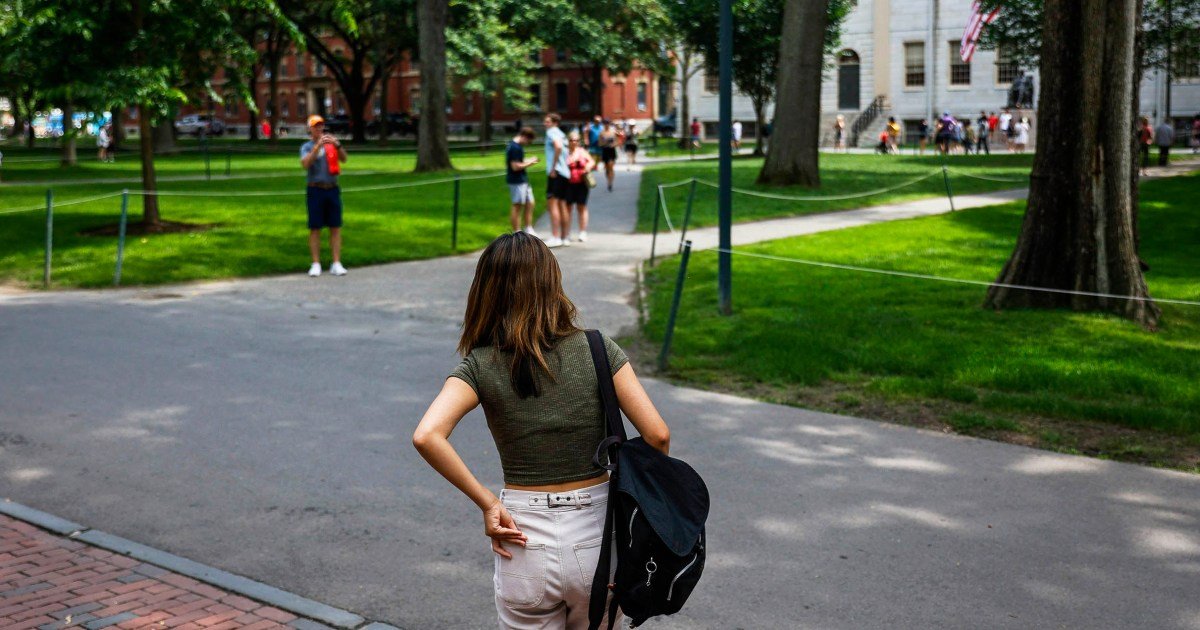
HONG KONG — If President Donald Trump doesn’t want international students at Harvard, there are plenty of foreign governments and universities happy to take them — along with their talents that have helped make the United States a global tech and scientific leader.
The future of international students at the oldest, richest and most renowned university in the U.S. is uncertain after the Trump administration announced a ban on their enrollment starting in the 2025-26 academic year.
After Harvard refused to turn over extensive data about its international students, Homeland Security Secretary Kristi Noem said the school was being held accountable for “fostering violence, antisemitism, and coordinating with the Chinese Communist Party on its campus.”
Harvard has sued over the move, calling it unlawful, and on Friday a federal judge in Boston put it on hold for two weeks. If the Trump administration prevails, new international students would be barred from enrolling at Harvard while current ones would be forced to either transfer elsewhere or lose their legal status.
U.S. universities including Harvard rely heavily on international students, who often pay far more in tuition than their American classmates. Many of them end up staying in the U.S., where they have been responsible for major breakthroughs in strategically important fields such as artificial intelligence where the U.S., China and other nations are locked in intense competition.
Trump’s campaign against Harvard is a “terrible policy error” that could undermine the world-leading role the U.S. has played in research and development since World War II, Simon Marginson, a professor of higher education at the University of Oxford, told NBC News in an email Monday.
A downturn in international students would affect American universities’ “talent pipeline” and income, while benefiting U.S. competitors, he said. “China will become significantly more attractive than before to students and researchers from the Global South,” he said, adding that “Western Europe will also gain significantly.”
There was already growing unease among international students at U.S. universities amid anti-immigrant rhetoric by Trump, in addition to deep funding cuts and efforts to intervene in universities’ internal operations. Hundreds of students’ visas have been revoked, while the Trump administration has detained and sought to deport others over pro-Palestinian and other activism.
At Harvard, more than a quarter of the student body of about 25,000 comes from overseas and the looming ban has caught up students from more than 140 countries, including the future queen of Belgium.
Harvard’s biggest group of overseas students, about 20%, come from China, which was long the top source of international students in the U.S. before being overtaken by India last year.
The number of Chinese students in the U.S. has been dropping —to about 277,000 during the 2023-24 school year, compared with more than 372,000 in 2019-20 — due to disruptions from the Covid-19 pandemic as well as growing U.S.-China tensions.
Chinese academics were also driven away by the China Initiative, a national security program from Trump’s first term that drew accusations of racial profiling. Many of them have moved their research to Chinese universities.
Responding to the Harvard ban, Beijing said U.S.-China educational cooperation is “mutually beneficial” and that it would “safeguard the legitimate rights and interests of Chinese students and scholars overseas.”
“China has consistently opposed the politicization of educational exchanges,” Foreign Ministry spokesperson Mao Ning said at a regular briefing in Beijing on Friday. “Such actions by the U.S. will only damage its own image and international credibility.”
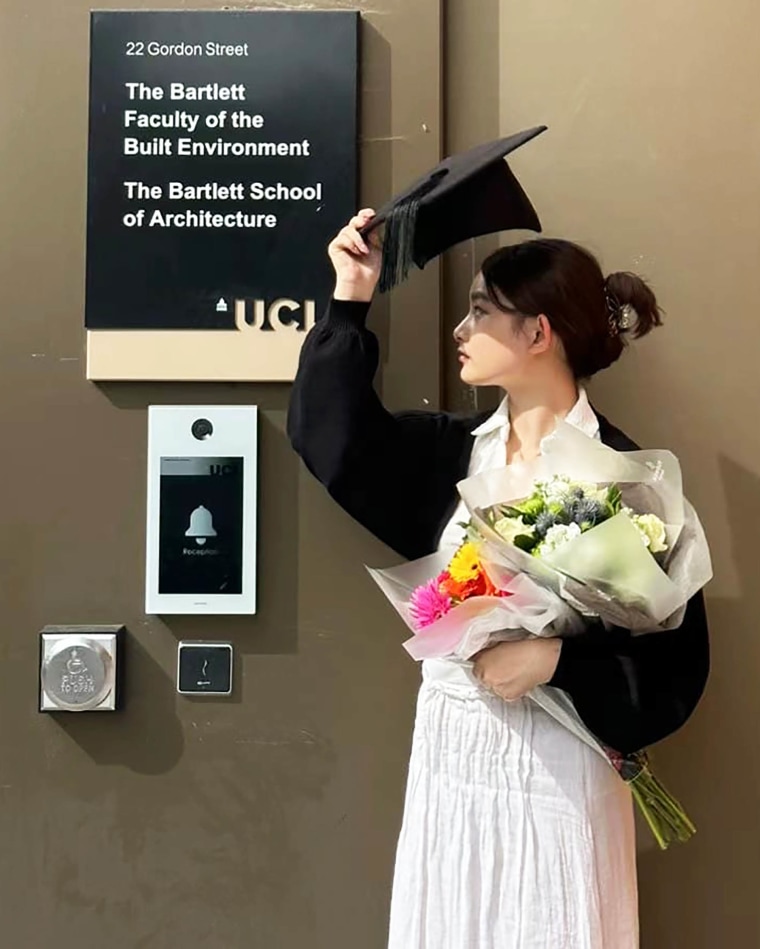
Izzy Shen, 23, an incoming Harvard student from Beijing, said her visa application was refused hours after Trump’s Harvard ban.
“I didn’t expect it to be so fast,” said Shen, whose application had already been marked “approved.”
Shen, who was admitted to Harvard’s Master in Design Engineering program, said she remained “relatively optimistic” and that the situation would “get clearer” after the injunction hearing Thursday.
Duo Yi, who was admitted to the PhD Public Policy program at Harvard Kenny School, said she is now exploring other options amid growing uncertainty about her enrolment. Trump is “simply too unpredictable,” she said. “I have no way of knowing what direction his future policies will take.”
Foreign governments and universities are not waiting to woo the Harvard students spurned by Trump. In the Chinese territory of Hong Kong, officials have urged universities to take proactive action “to attract top talent.”
Hong Kong’s “doors are wide open” to “any students who face discrimination and unfair treatment in the U.S.,” John Lee, the city’s top leader, said Tuesday.
Hong Kong has four universities in the top 100 of U.S. News & World Report’s Best Global Universities Rankings, which is topped by Harvard, though experts say academic freedom in the former British colony of 7.5 million people has eroded since Beijing imposed a national security law in 2020.
The Hong Kong University of Science and Technology said Friday that Harvard undergraduates and postgraduates, as well as students with confirmed offers of admission, were welcome to study there instead.
Europe has also sought to lure scientists worried about funding cuts and freedom of research under Trump, launching a $570 million initiative this month called “Choose Europe.”
Though she did not mention Trump by name, European Commission President Ursula von der Leyen emphasized “free and open research” in a speech promoting the initiative at Sorbonne University in Paris.
“As threats rise across the world, Europe will not compromise on its principles,” she said. “Europe must remain the home of academic and scientific freedom.”
Despite concerns about the Harvard ban, Alex Zeng, an overseas education consultant based in the southern Chinese city of Guangzhou, said American universities remained the top choice for many Chinese students.
“The rich still want to go to the U.S. for education,” Zeng said.
Education
Trump administration seeks to end all federal contracts with Harvard
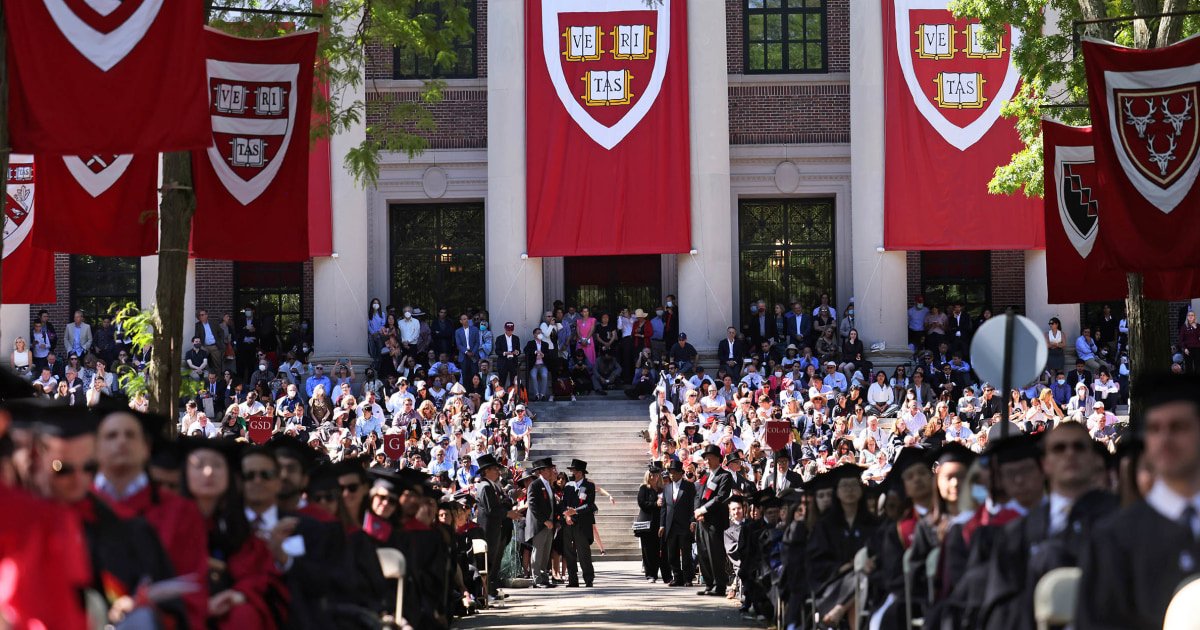
The Trump administration intends to ask all federal agencies to seek ways to end their contracts with Harvard University, a senior administration official told NBC News on Tuesday.
“GSA will send a letter to federal agencies today asking them to identify any contracts with Harvard, and whether they can be canceled or redirected elsewhere,” the senior official said, referring to the General Services Administration.
The development was first reported by The New York Times.
The aimed cuts mark the latest escalation in a monthslong fight between the Trump administration and the nation’s oldest — and arguably most prestigious — university.
A copy of the letter, obtained by NBC News, instructs agencies to respond to the GSA with a list of contracts they have terminated with the university by June 6.
“Going forward, we also encourage your agency to seek alternative vendors for future services where you had previously considered Harvard,” the letter, signed by John Gruenbaum, the commissioner of the GSA’s Federal Acquisition Service.
Gruenbaum described the administration’s actions as bolstering civil rights. He accused Harvard of defying a Supreme Court ruling that banned considering race in its admissions process and of “ongoing inaction” over the harassment of its Jewish students.
Harvard did not immediately return a request for comment.
The directive comes a day after Trump said in a post on Truth Social that he was considering taking $3 billion of grant money away from what he called “a very anti-Semitic” Harvard, and giving the funds to trade schools instead.
The feud between the government and Harvard largely stems from the university’s refusal to comply with sweeping demands from the Trump administration’s Task Force to Combat Anti-Semitism last month. The task force sought to review who Harvard can admit or hire and subject its faculty to a government audit.
In response, the administration stripped the university of $2 billion in federal research funding.
The administration also sought to block Harvard’s ability to enroll foreign students last week, an effort that was temporarily blocked by a federal judge after the university sued.
If the administration’s effort is successful, Harvard’s foreign students, who make up roughly a fourth of the university’s student body, would lose their legal status to stay in the United States and have to transfer to a different university.
-

 Africa4 days ago
Africa4 days agoSurvivor of Liverpool car ramming talks of shock and panic
-

 Sports3 days ago
Sports3 days agoThe Knicks are bringing hope and title dreams back to New York after years in the doldrums
-

 Lifestyle3 days ago
Lifestyle3 days agoChildren and careers: Talking to kids about what they want to be when they grow up
-

 Lifestyle4 days ago
Lifestyle4 days agoHow to decorate a patio, balcony or other small outdoor space
-

 Asia5 days ago
Asia5 days agoHuge blast rocks Chinese chemical plant, authorities launch rescue operation
-

 Lifestyle3 days ago
Lifestyle3 days agoFaizan Zaki hopes to go from spelling bee runner-up to champ
-

 Europe5 days ago
Europe5 days agoTrump’s talk on Ukraine is cheap but the Kremlin has set him a pivotal test
-

 Middle East4 days ago
Middle East4 days agoGaza’s aid system isn’t broken. It’s working exactly as designed | Humanitarian Crises




